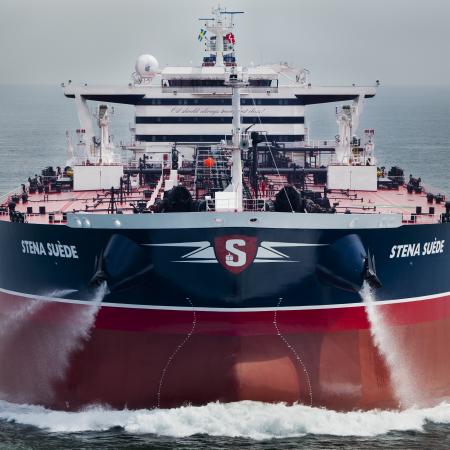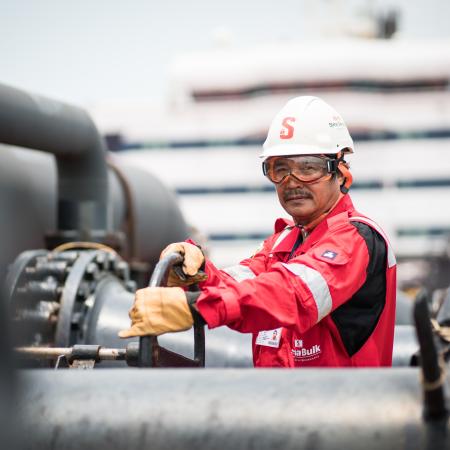Age restriction on tankers is killing innovation and is a threat to improved environmental progress
The age discrimination of tankers over 15 and 20 years of age is not only jeopardizing safety on our seas. This approach will in our opinion also prevent the implementation of new fuels that is crucial for reaching long-term environmental goals and reversing the global climate change crisis.
At the moment, the environmental efforts in our industry are focusing on complying with the IMO2020 Sulphur regulation. Many companies have made major investments in this area and scrubbers will be installed on many ships throughout the globe before January 2020.
However, installing scrubbers is a short-term solution based on a decision that many parties and organizations are questioning today. The environmental gains are uncertain from a holistic sustainability perspective. What short term means remains to be seen, but we know that scrubbers will not be the one and only single solution for the future in the same was as all today’s relevant alternatives.
Already today the industry is facing major investments due to new regulations. Despite that most of us believe this is only the beginning in our industry that soon will be faced with major investment challenges in the search for fuels that will run our ships when more stringent emission standards become a reality in 2030 and 2050.
LNG, bio-fuels, methanol dual-fuel, electricity, fuel cells or something even more innovative?
We don’t know yet. Innovation and development will as always with certainty need many progress steps to live up to future regulations and requirements, even if the time now is limited!
But there is no doubt that finding the best answers to the question is a multi-billion-dollar issue – and that no shipowner will be prepared to invest in technology for future legislations if the earnings from these ships are torpedoed by a 15 or 20-year age limit.
A sustainable approach from a shipowner´s point of view is to build and maintain quality ships with a technical lifespan of 30 years and apply a financial model with a 25-year repayment year perspective which will enable flexibility and innovations for sustainable solutions to our industry.
We have the last decade seen many companies go under or entering into chapter 11 due to a bad market. Is this only due to bad timing entering the market? It is of course owners own fault that we order too many ships and “sell” ourselves too cheap as we are, and this is of course yet another challenge to handle. Would as an example a 30-year commercial trading limit change this? For some, yes. All in all, there is for sure a case saying that if a safe ship can be traded longer, it will be more room for innovation dealing with the upcoming regulations for both existing ships and new ships. As said, this will not be done in one step, but many small steps, with some ideas that work and some that does not.
Isn’t age restriction an old way of managing the issues we faced 20 years ago? Now when all serious players in the industry have a complete new set of measurements that controls safety and quality. This would be an easy way to collaborate through the industry and the takers of the services needed in the World to assure we continue to develop these measurements.
In other words: Age restrictions do not only increase the risk of accidents instead of preventing them. We also claim that these restrictions go against the strong sustainability trend in the global society; demands for rapid change voiced by young icons of the next generation decision makers that we see now is making their voice heard.
Companies who want to protect their image should increase the focus on listening to this growing movement rather than counteracting its good intentions by punishing ships in good mint condition.
The responsibility for the transition to new fuels must go way beyond developing new ship technology. Innovative shipowners must be supported by an infrastructure that ensures large-scale availability of new fuels. This is an equally important enabler in our industry as it is for driving progress in other areas of our society.
We also need customers that recognizes the long-term benefits of chartering the existing ships; promoting sound repayment plans by using established quality tools – maintenance standards, inspection results and CAP ratings – instead of age restrictions.
Here is a challenging question to those who practise an age limit instead of focusing on what is important, quality and the way the ship is run:
What will be the financial and logistic consequences if the stubbornness damages the innovation of new technology so much that you 20 or 30 years ahead face a shortage of tonnage that complies with the environmental standards because the investments and the many steps we now need to take never took place due to an unhealthy financial environment?
As we all know, quality, safety, innovation and performance go hand in hand, while today’s age discrimination is old fashion legacy reducing the possibility to take us into the future in a sustainable way.
We are all in the same boat and only by collaborating we will solve the climate crisis.
Erik Hånell is chief executive of Stena Bulk. Kim Ullman is chief executive of sister company Concordia Maritime.
For further information, contact:
Erik Hånell
President & CEO
Stena Bulk AB
Mobile: +46 704 855 002
erik.hanell@stenabulk.com
Kim Ullman
CEO
Concordia Maritime AB
Mobile: +46 704 855 003
kim.ullman@concordiamaritime.com




